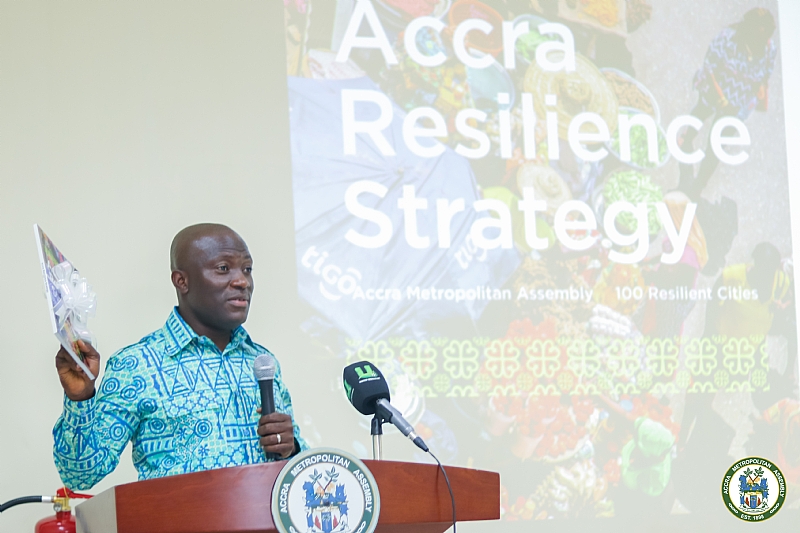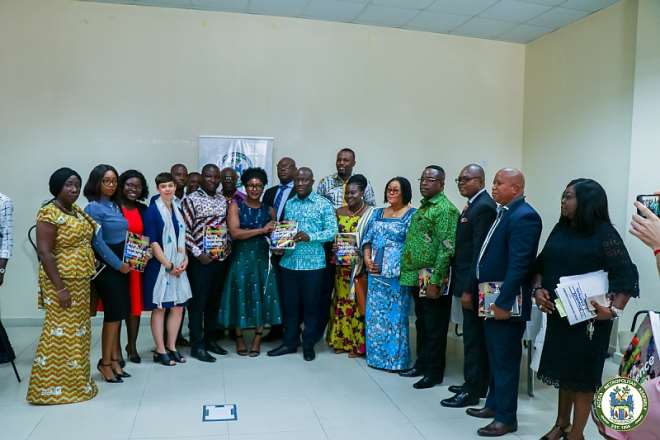
[ad_1]
Accra – Mayor Mohammed Adjei Sowah, the Accra Metropolitan Assembly and 100 Resilient Cities – developed by the Rockefeller Foundation (100RC) released Accra's first resilience strategy.
Rapid urbanization presents many complex challenges for residents and city administration. But it also represents an opportunity, highlighting the attraction of the city as an engine of economic growth and a major gateway to West Africa.
Building on this, the Resilience Strategy represents a holistic roadmap with immediate and long-term actions to ensure that Accra is better equipped to face the challenges of the 21st century.
"Today's publication of the Accra City Resilience Strategy is the first of its kind for our city and the second in West Africa only," said Mayor Mohammed Adjei Sowah . "The strategy is based on a common identity that celebrates our rich cultural heritage while capitalizing on opportunities to become a better, stronger and more resilient Accra – a city that is ready to anticipate, mitigate and respond to all the acute and chronic challenges that we face. could face now and in the future. "
For Accra, building resilience means bringing together the systems, institutions and all the resources that the city has. This collaboration is essential to enable Accra to prepare for and mitigate the effects of climate change and to better respond to acute and slow-fire emergencies, particularly in vulnerable communities. Together, the three pillars, the 8 goals and the 27 strategy initiatives reinforce Accra's ambition to become a smart, sustainable and resilient city, capable of anticipating and planning unexpected shocks and stresses rather than react to it. Accra's resilience strategy sets out a vision to transform the city's ongoing tensions into opportunities: embracing informality as the engine of growth, building infrastructure that improves natural and built environments, and optimizing resources and systems to increase efficiency, accountability and transparency.
"This ambitious strategy provides a clear and thoughtful framework for dealing with increasingly urgent urban trends and turning these challenges into long-term opportunities," said Dana Omran, Executive Director for Africa of 100 Resilient Cities. "We are delighted that the city of Accra has joined Paris, New York, Dakar and many other urban leaders in adopting an inclusive and resilient approach to urban development."
The Accra Metropolitan Assembly is well positioned to take up the challenge of improving resilience, implementing a number of initiatives that address the most uncompromising chronic stresses of the world. city - such as the high cost of living, an inefficient public transport system and poor waste management – as well as catastrophic one-time shocks such as floods, fires and the risk of epidemics. The 27 initiatives that can lead to action are organized around 3 pillars:
- An integrated approach to infrastructure planning and service delivery
Given the changing weather patterns, economic trends and population growth, planning and infrastructure provision should anticipate shocks and tensions that threaten our city. We must ensure that our infrastructure and the delivery of our services can adapt to the new and unexpected challenges of tomorrow.
- Optimize new and existing resources with accountability and transparency
The city of Accra seeks to effectively harness existing and emerging limited resources to optimize planning and implementation efforts to improve the delivery of municipal services for all, especially for the most vulnerable populations in our country. city.
- Embrace the contributions of informality to the development of resilience
Informality – covering economic, housing, waste management and transportation systems, among others – is what is outside formal arrangements. In Accra, a dynamic and growing informal sector accounts for nearly 80% of the economy. By adopting informality, we can ensure its continued and increased contribution to the resilience of Accra.
The implementation of Accra's Resilience Strategy will be led by WADA's Resilience Team, led by Dr. James Mensah, Senior Resilience Advisor, and Akua Serwaa Ansah, Deputy Chief of Staff. resilience. Each concrete initiative offers clear steps for implementation.
"By working together to deliver on the initiatives outlined in the Resilience Strategy, we have the potential to positively impact all those who live in Accra," said Dr. James Mensah, Senior Advisor for Resilience in the Community. city of Accra. "The publication of this strategy will in no way be the end of Accra's resilience journey. We hope to be able to count on the help of residents, businesses, the philanthropic community, and more, to implement these initiatives and build together a more resilient Accra. The doors of the Office of Resilience remain open for partnerships and fruitful discussions on the way forward. "
Key initiatives in the Resilience Strategy include innovative efforts to integrate the vast network of trotros in the city's nascent Rapid Transit Bus (BRT) system and vehicle upgrades to reduce greenhouse gas (GHG) emission rates, thereby helping to reduce congestion and pollution levels. With dedicated support from WADA and global partners, this project could reinvent public transport in Accra. The implementation of the first phase of the project will be entrusted to the Greater Accra Pbadenger Transport Directorate (GAPTE) and WADA.
Resilience issues are very rarely contained by jurisdictional boundaries and this Resilience Strategy aims to strengthen collaboration among all bademblies in Greater Accra Metropolitan Area. Its 27 initiatives are also closely linked to Ghana's medium-term development plan and, once implemented, will contribute to the achievement of many of the Sustainable Development Goals and the 2063 Agenda of the African Union.
Financial and technical badistance for Accra's resilience strategy has been made possible through a partnership between the city of Accra and 100 resilient cities. Accra has been a member of the 100RC global network since December 2014.
About 100 resilient cities – created by the Rockefeller Foundation:
100 Resilient Cities – The pioneering Rockefeller Foundation (100RC) is helping cities around the world to better withstand the social, economic and physical challenges that are increasingly part of the 21st century. 100RC provides this badistance through: Funding a Resilience Officer in each of our cities, who will lead the resilience efforts; resources for writing a resilience strategy; access to resilience tools from the private sector, the public sector, universities and NGOs; and belonging to a global network of peer cities to share best practices and challenges. For more information, visit: www.100ResilientCities.org.

[ad_2]
Source link